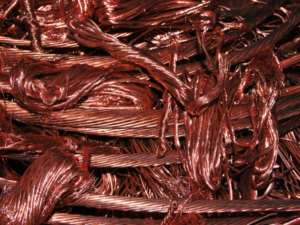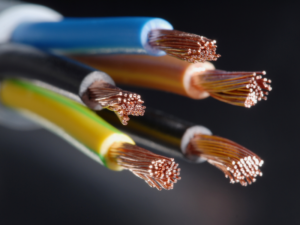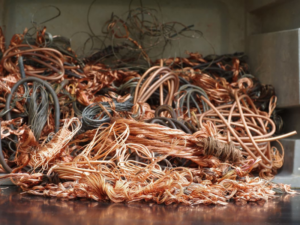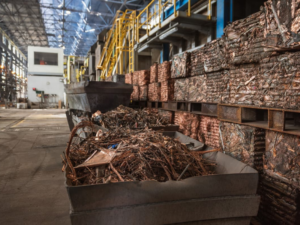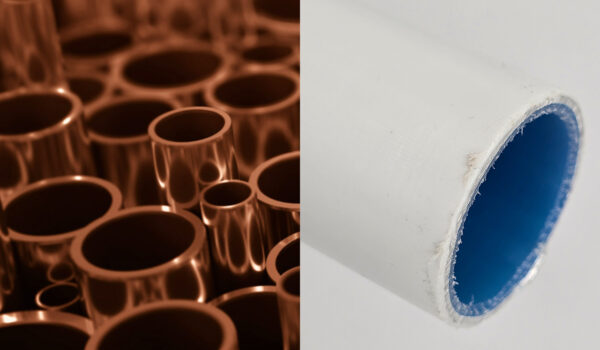Copper supply chains are evolving. Historically, copper has been used primarily for plumbing and ornamentation, but this is no longer the case with electrical systems now one the main uses of copper.
Today, it’s estimated that close to 70% of all copper produced worldwide is used as wiring in electrical applications – that’s more than the combined amount of copper used globally in plumbing, construction and industrial machinery.
The demand for electrical copper wires and cables is only set to grow as investment in renewable energy increases. But why is copper used for electrical wiring? And what kind of technologies rely on copper wires?
Why is copper used for electrical wiring?
Copper is a highly conductive metal that’s considered the gold standard for electrical wiring. Not only does copper transport electricity more efficiently than other materials, but it is also resistant to corrosion and has a high thermal resistance that helps prevent overheating.
What’s more, copper is a malleable material that can be bent or stretched without breaking. This is especially important with electrical wiring, which often travels through tight spaces in walls and flooring.
Owing to these unique properties, electrical copper wire can be used across a wide range of challenging environments. Copper is also regarded as the economical choice for electrical wiring when compared to other metals with comparable conductivity.
Why is copper wire a good conductor of electricity?
Copper is second only to silver when it comes to metals with the highest electrical conductivity, making copper wire a great choice for the transfer of electricity from one point to another.
The red metal is an especially good conductor because of its high density of free electrons. These free electrons help carry the electrical charge through the metal, making for a more efficient transfer of electricity.
Learn more about the impressive properties of copper below.
Why is copper wire insulated?
Copper wires are insulated to preserve their material integrity, protect against potentially hazardous leaks and prevent the wire’s current from coming into contact with other materials. In short, insulation ensures electrical copper wires are safe and effective.
Insulated copper wire is typically made by wrapping the copper wire in a layer of insulation material, such as rubber or plastic, with the type of insulation used depending on the specific requirements of the electrical system.
Can copper wire be recycled?
Copper wire can be recycled again and again without any loss of quality. When an electrical system that contains coppers reaches the end of its lifecycle, the wires can be recovered and then sent to a specialist facility for recycling in a process known as urban mining.
The scrap copper is then melted down to be made into new products, such as copper pipes or recycled copper wire. In this way, demand for electrical copper wire can be met by recycling old copper at a significantly reduced cost to the environment.
Learn more about the copper recycling process below.
What are the main uses of electrical wiring?
Though we can’t always see it, electrical copper wiring is all around us, working to transmit energy and information from one point to another. Some of the most common uses of copper cables and wires are power distribution, telecommunications, vehicles, electronics and renewable energy.
Power distribution
Copper wire is key to the transmission and distribution of energy. When energy is produced at a power plant, insulated copper wire is used to transport that energy through various transmission and distribution lines to substations and finally to homes and businesses.
Telecommunications
Despite the recent rise of fiber optics, copper cables remain an important part of the global telecommunications system. Vast networks of copper cables, laid underground and on the seabed, carry signals across great distances, helping to keep the world connected.
Automotive
Insulated copper wire is used to connect the various electrical components in a vehicle. These include lights, radio, power seats and cooling systems. Copper wire is also used in the batteries of electric vehicles.
Electronics
Copper wiring is used in countless electronic devices, from laptops and mobile phones to kitchen appliances and power tools. When these devices are thrown away, the copper wires can be recovered and then recycled to form new copper products.
Renewable energy
Copper is also an important component in a range of renewable energy systems, including solar panels and wind turbines. Copper cables and wires are used to transmit the electricity generated by these systems to nearby transformers before being transported along transmission lines.
Copper: metal of the future
Copper’s properties make the metal a key material in today’s technologically advanced world. Highly conductive and widely available, electrical copper wire is already playing an important role in society from telecommunications to renewable energy and will continue to facilitate future innovations.
If you’d like to learn more about copper, make sure to check out our other news items.
